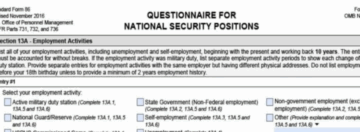Why You Probably Shouldn’t Have a Clearance

In a recent Department of Energy clearance denial appeal the judge turned the tables on the applicant’s argument that he misunderstood the questions on the SF-86 application as to why he didn’t disclose delinquent taxes, debts, and arrests. The issues in this case involved the applicant failing to file his taxes, getting evicted for not paying his rent, taking out new credit cards and loans in order to pay his living expenses, getting a speeding ticket and then failing to pay it, resulting in suspension of his driver’s license, and then getting arrested for driving on a suspended license. To top it all off, he didn’t disclose any of this information on his application for the security clearance.
At the appeals hearing he argued he had misunderstood or misinterpreted the questions: he didn’t think being arrested for driving on a suspended license was a police action because the charges were later dismissed; he wasn’t aware that he had to file taxes since he had taxes taken out of his pay each paycheck; and he was never served with a legal notice from his landlord or creditors about being delinquent in payments. The judge acknowledged that the applicant had mitigated the financial irresponsibility issues by getting his taxes filed, agreeing to a payment plan with the landlord for the judgment, and entering into a debt repayment program with the remaining creditors. However, the personal conduct issue by not disclosing all of the required information on the form was not mitigated. The judge provided this explanation: “I am not confident, however, of how the individual would respond when faced with new challenges in the future. In particular, I am not convinced that he would follow appropriate protocol with respect to handling classified material, were he placed in a situation of some complexity. I am also not convinced that he would recognize that he did not know how to respond. Nor am I convinced that he would seek advice from classification or security experts, rather than simply act on his understanding, as he has in the past. In my opinion, the individual displays an unmerited sense of self-confidence in his ability to know what is right. This trait may well temper with maturity, but as of now, I find a substantial risk that he might not handle classified material properly under all circumstances”.
Putting it nicely, it seems the judge was trying to say: If you don’t have the common sense it takes to interpret, understand, and answer what is pretty straightforward on the clearance application, then how can the nation trust you to interpret and understand how to handle classified information?



It seems to me that this person probably tried to intentionally withhold these points that were brought up thinking he wouldn’t get caught. Then when they did come to light, his excuse was that he “didn’t know” those items needed to be listed. In other words, now that he is caught his only way out is saying that he didn’t know. I don’t think that excuse works in any scenario, so I agree with the judge. If you don’t have the common sense to understand what needs to be put down in the background packet, then you probably shouldn’t hold a security clearance and possibly put our nation in Jeapordy. Interesting article Marko!
Even beyond his potential to mishandle classified information, I have no confidence that this guy could handle the OTHER responsibilities of a job . . . Or, feeding himself . . .
I can never understand why folks with this type of background even bother to apply for employment requiring any type of clearance!
I think that the answer to that is pretty much self-evident . . .
I agree whole heartedly to what the judge said however with your logic xenonman you seem to be implying that just because one made mistakes in the past that he or she should refrain from applying from a job that requires a clearance. People make mistakes however unlike the gentleman who the judge ruled was unfit for a clearance, some people actually learn from their mistakes and become better individuals. Great article Marko!
Maybe I’ve just become very cynical on this issue, having once been denied employment requiring a TS clearance. At the time, I had perfect credit and no police record. The only negative info. came from some co-workers at a part-time job that I worked at while in school. These were all “developed” (non-authorized) contacts.
Then I read in this forum about cases such as the one discussed here, and also another one I recently read elsewhere in the blog from someone who was IMPRISONED for INVOLUNTARY MANSLAUGHTER in the early '00’s, who inquires as to whether he would now be able to obtain a security clearance!
The whole BI and clearance process is an outrageous can of worms, which leaves many qualified applicants out in the cold.
Developed contacts are not unauthorized. It’s an investigation, not some corporate reference check.
Xenonman . . . I agree with you for the most part . . . These investigations would go much quicker if some common sense, or perhaps better guidance, was provided to investigators and adjudicators earlier in the process. These people appear to believe that their job is to deny clearances and make applicants work for their approval. They should be allowed to recognize, for example, that many good people have had financial problems in the economic wake of the 2007-8 financial crisis. It seems like it is easier for them to deny clearance and, effectively, pass the decision on to the next level.
My investigation and adjudication took just short of 17 months. Does anyone believe that it should actually take 17 months to make this type of decision? Six months? It took six months just get an investigator assigned to my application!